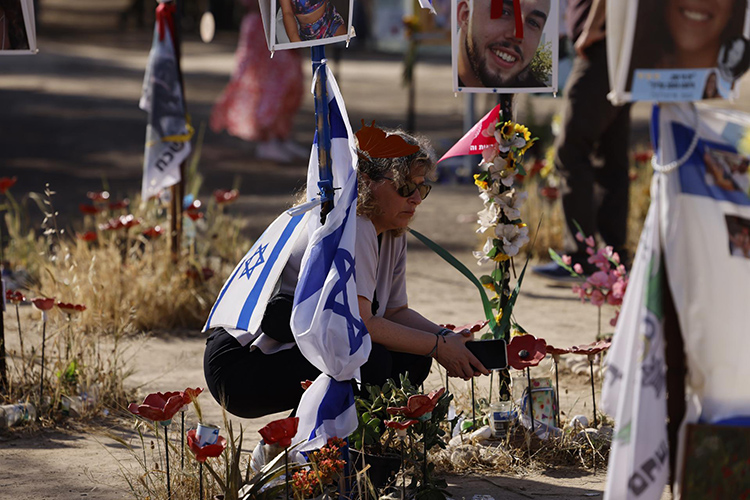
By Heidi Gantwerk
SHA’AR HANEGEV, Israel — Greeting people in Israel you usually ask “mah nishmah,” what’s new? or how are you? Or maybe “mah koreh,” what’s happening? The answer is usually “kol b’seder,” everything is okay or “kol tov,” all is good. After spending the last week in Israel, these greetings just feel wrong. People still ask, but they know “lo kol b’seder,” everything is not okay.
I hope you have had the chance to read some of the heartfelt writings from the participants on last week’s Solidarity Mission to Israel. I cannot imagine a kinder, more thoughtful and supportive group of people with whom to share these intense, often painful and sometimes inspiring experiences.
We met with the families of hostages still being held in airless tunnels 40 meters underground in Gaza now for 184 days. We spoke with survivors of unspeakable horror on October 7 and with leaders and soldiers from the Bedouin community who jumped into action to defend and support Israel, only to be met with growing and dangerous anti-Israeli Arab sentiment. We heard from first responders who were forced, under fire, to choose who lives and who dies. With artists who have used their gifts to tell essential stories and help people heal. Of course, we spent precious time with our friends in Sha’ar HaNegev, and with the communities that have been living as evacuees for six months. And that just scratches the surface.
Throughout the week, we visited physical sites that saw horrific terror on October 7. The Nova Music Festival site was devastating. The police station in Sderot. The gate of Kibbutz Erez. A display of hundreds of bullet-ridden and burned cars that had carried young people fleeing Nova and Hamas. How to commemorate is a huge question here as the country approaches Yom Ha Zikaron and Yom HaAtzmaut. But the act of commemoration is made immensely more complicated when the conflict is ongoing, and the trauma is raw.
Today, I am writing from Sha’ar HaNegev, where just this morning a therapist told me that here, it is still October 7. I can hear Israeli artillery in the background. This morning brought news of four soldiers killed overnight in Gaza. Last night I attended a somber protest focused on the safe return of the hostages. This morning, I attended a meeting of the management team. The sheer number of daunting challenges they are reviewing is overwhelming.
They are struggling to get traumatized children to attend school. They are doing scenario planning for a retaliation attack from Iran that could cripple the country’s electrical and communications systems. The municipality is struggling to hire enough workers. They are addressing the trauma needs of the community where the demand for therapy has increased more than 700%. And they are planning to mark Pesach, Passover, as a team; always balancing the desire for moments of normalcy and even celebration with the ongoing anger, sadness and worry. Plus a thousand other things.
In spite of all of this, in some ways I find it easier to be here in Israel. As a friend said to me this morning, I am surrounded by people who share my rage and grief. I don’t need to discuss or explain.
Today marks six months since October 7. As the war progresses and pressure builds on Israel from around the world, our connection to and support for the people of Israel is more important and meaningful than ever. I come back to San Diego strengthened in my ties to this complicated place and these resilient people.
On our trip, Charlene Seidle, President and CEO of Leichtag Foundation, reminded us of the words of Rabbi Lord Jonathan Sachs about hope, and those reflections have stayed with me. Hope is the most precious commodity in this country. And unlike optimism, which is a feeling, hope is an action; it the hardest thing to do. So we will continue to hope; for the return of the hostages, for the end of the war, and for a more peaceful future.
*
Heidi Gantwerk is President and CEO of the Jewish Federation of San Diego.